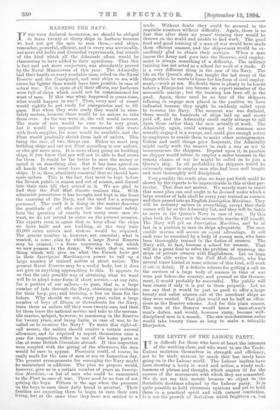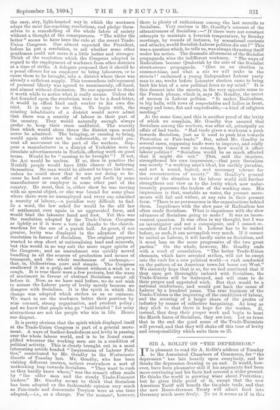THE LEVITY OF THE LABOUR PARTY.
IT is difficult for those who have at heart the interests of the working class, and who want to see the Trade- Unions maintain themselves in strength and efficiency, not to be made anxious by much that has lately been going on in the Labour world. The Labour leaders have been showing a levity in word and action, a. windy reck- lessness of phrase and thought, which augurs ill for the success of the movements with which they are connected. We do not say this merely because we object to the Socialistic doctrines adopted by the Labour party. It is quite possible to hold erroneous opinions and yet to hold them in a practical spirit and with earnest conviction. It is not the growth of Socialism which frightens us, tut the easy, airy, light-hearted way in which the workmen adopt the most far-reaching resolutions, and pledge them- selves to a remodelling of the whole fabric of society without a thought of the consequences. " The wilder the better " seems to have been the rule at the recent Trade- Union Congress. One almost expected the President, before he put a resolution, to ask whether some other gentleman could not move it a little hotter and stronger. Think of the resolution which the Congress adopted in regard to the employment of workmen from other districts at a time of strike. A delegate proposed that it should be a penal offence for an employer to bring labourers, or to cause them to be brought, into a district where there was already a sufficient supply. This tremendous infringement of personal liberty was agreed to unanimously, off-hand, and almost without discussion. No one appeared to think it worth while to notice what it really means. Unless the Act founded upon the resolution were to be a dead-letter, it would in effect bind each worker to his own dis- trict. It is easy to see this. To begin with, the existing inhabitants of a district would never admit that there was a scarcity of labour in their part of the country. They would naturally enough always prefer to keep their store undiluted. The scarcity then which would alone throw the district open would never be admitted. The bringing, or causing to bring, would again either not be enforceable, or would pre- vent all movement on the part of the workers. Sup- pose a manufacturer in a district of Yorkshire were to circulate advertisements in Norfolk, offering work on good terms. Would he be causing to be brought " ? If not, the Act would be useless. If so, then in practice the Norfolk people would have little chance of bettering themselves. No man would be allowed to leave his home, unless he could show that he was not doing so be- cause he had seen an offer of work put forth by some manufacturer or employer in some other part of the country. He must, that is, either show he was moving with no special object, or else was bound for some place where there were no unemployed and every one admitted a scarcity of labour,—a paradise very difficult to find. In a word, the law asked for would be the old law of settlement over again in an aggravated form, and would bind the labourer hand and foot. Yet this was the resolution adopted by the Trade-Union Congress as lightly as if it were a vote of thanks to the church. wardens for the use of a parish hall. As great, if not greater, levity was displayed in the adoption of the resolution in favour of Socialism. The original proposer wanted to stop short at nationalising land and minerals, but this would in no way suit the more eager spirits of the Congress; and an amendment was quickly moved bundling in all the sources of production and means of transport, and the whole mechanism of exchange,— that is, Collectivism pure and simple. The Congress swallowed it at a gulp, and almost without a wink or a cough. It is true there were a few protests, but the wave of sentiment in favour of abstract Socialism swept all before it. Now, as we have said before, we do not wish to accuse the Labour party of levity merely because we disagree with Socialism. It is the spirit in which the change was adopted which strikes us as so ominous. We want to see the workmen better their position by wise counsel, strong organisation, and prudent policy ; and we know that people who go " bald-headed " for noisy abstractions are not the people who win in life. Hence our disgust.
It is pretty obvious that the spirit which displayed itself at the Trade-Union Congress is part of a general move- ment. A wave of feather-headedness and levity is passing over the whole labour world, and is to be found exem- plified wherever the working men are in a condition of political activity. This is clearly brought out in a most interesting article headed " Impressions of Labour Poli- tics," contributed by Mr. Goadby to the Westminster Gazette of Tuesday last. Mr. Goadby, who has been visiting different centres, notices everywhere a sort of unthinking leap towards Socialism. " They want to rush us they hardly know where," was the remark often made by " the older men and the steady Trade-Unionist leaders." Mr. Goadby seems to think that Socialism has been adopted as the fashionable opinion very much as Fair-trade and democratic Toryism were at one time adopted,—i.e., as a change. For the moment, however, there is plenty of enthusiasm among the last recruits to Socialism. Very curious is Mr. Goadby's account of the attractiveness of Socialism :—" If there were not constant attempts to maintain a feverish temperature, by Sunday meetings, by rounds of lectures, by sensational contests and attacks, would Socialist-Labour politics die out ?" This was a question which, ho tells us, was always thrusting itself under his notice. The dramatic allurement of the Socialist propaganda wins the indifferent workmen. " The ways of Radicalism become Quakerish by the side of the Socialist street-corner propaganda. Give us an election in summer-time, and what a stir we will make in the streets ! ' exclaimed a young Independent Labour party man to me, weeks before Leicester election came to bring back his hint of a new political force to my mind." It is this descent into the streets, in the very opposite sense to the French phrase, which is, says Mr. Goadby, the secret of success in Labour politics. " It makes Radicalism, in big halls, with rows of respectables and ladies in front, stagey and tame, flat and unprofitable,—a kind of religious meeting."
At the same time;and this is another proof of the levity of which we complain, Mr. Goadby was assured that Socialism among the workers, was after all, principally an affair of bad trade. " Bad trade gives a workman a push towards Socialism, just as it used to push him towards Protection or Fair-trade." But, asked Mr. Goadby in several cases, supposing trade were to improve, and really prosperous times were to return, how would it affect labour politics? "Socialism would be so much affected that it might die out." This, said the inquirer, strengthened his own impression,—that pure Socialism was merely " a working man's ideal, his earthly paradise, and not a sound, logical, and necessary scheme for the reconstruction of society." Mr. Goadby's general review of the situation in the labour world still further strengthens our view as to the levity which now unfor- tunately possesses the leaders of the working men. His impression is that, unstable as water, the present move- ments will fail and wither, at any rate in their present form. "There is no permanence in the organisations behind them. Impatience with the slow pace of Radicalism has often made Socialism. What is impatience with the slow advances of Socialism going to make ? It was an incon- venient question. It was often in my thought, but I was an investigator and not a campaigner, and I cannot re- member that I ever asked it. Labour has to be united before, as such, it can accomplish very much. If it cannot be united as Labour, it will hardly unite as Socialism, and it must lean on the more progressive of the two great parties." On the whole, however, Mr. Goadby ends with a word of consolation. " The better Trade-Union elements, which have arrested strikes, will not be swept into the rush for a new political world—a rush conducted on the pattern of an American town-lot boom out West." We sincerely hope that is so, for we feel convinced that if they once get thoroughly imbued with Socialism, the Trade-Unions will be destroyed, and will cease to do their proper and appointed work. But that would be a national misfortune, and would put back the cause of Labour by a hundred years. The true business of the Trade-Unions is the improving of the conditions of labour, and the securing of a larger share of the profits of industry by means of collective bargaining. As long as they stick to that there is hope for the worker. If, instead, they drop their proper work and begin to hunt. the March hares of Socialism, they are lost. Let us trust that in the end the good sense of the Trade-Unionists will prevail, and that they will shake off this tone of levity and irresponsibility which suits them so ill.



































 Previous page
Previous page